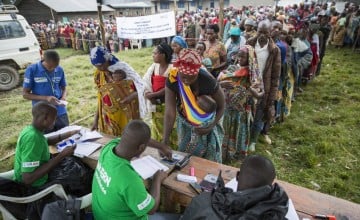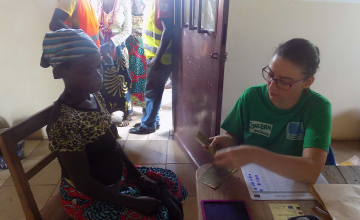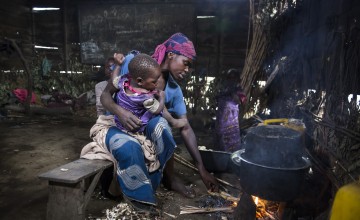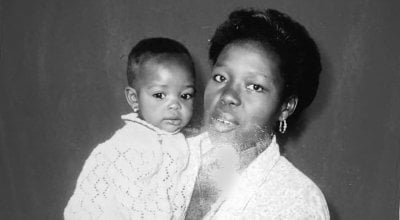
Read our 2024 annual report

Knowledge Hub
Cash transfers empower the displaced in DRC
Cash transfers can transform the lives of those who have been forced from their homes. Joanne Cagin, Concern’s Livelihoods Programme Manager, reports from the Democratic Republic of Congo (DRC)
Growing up in France, I always had a love of languages, and tackled both English and Spanish in school.
In the six months I spent working in Bosnia, I picked up enough of the local language to hold down a decent conversation. I always thought I would end up living somewhere where I could use one of my learned languages. And yet, I find myself here in the DRC, speaking my native French.
I live and work in the province of Katanga, in the south-east of DRC, working as a livelihoods programme manager with Concern. I have lived in many countries around the world, including Cameroon, the Philippines and Ukraine, but DRC is the most difficult and challenging place I’ve ever experienced. It is also one of the most rewarding.
Conflict drives displacement
DRC has faced a decades-long crisis and is one of the poorest countries in the world, ranked 176 out of 188 countries in the United Nations Human Development Index (2015). More than 85% of the population live on less than $1.25 per day, and only 26% of the population has access to clean, safe water.
The region where I live, Manono territory, has experienced a resurgence in conflict in recent years. This has led to a huge homelessness crisis, with people being forced to flee from their homes and villages in search of safety. Across the country, there are an estimated 2.8 million people displaced from their homes because of violence.

One meal a day
Being uprooted from your home makes every aspect of daily life enormously difficult. People do not have enough food to eat. Concern’s own research on the ground indicates that many people affected by the conflict have been forced to reduce the number of meals per day from three to one. People have been unable to access their fields during the planting season, meaning their food supply for the coming months will be close to zero.
The vast majority of the displaced people are living in shoddy, makeshift houses constructed only from sticks and tree bark. These shelters barely protect them from the rain and expose entire families to serious health risks. Cholera is a real risk to mobile populations as their only source of water is unprotected wells, ponds or rivers. Other diseases are also a risk - there was a huge measles epidemic just last year.
Concern in DRC
Concern has been operational in DRC since 1994 in North Kivu, expanding to central Katanga in August 2007. We are one of the few agencies with a well-established long-term presence in Manono territory.
With the funding and support of the European Commission (ECHO), we are reaching out to help the extreme poor and most vulnerable people in Manono. For those who fled their homes suddenly, basic cooking and washing supplies are essential, so we have distributed household and shelter kits to 2,000 households. This package includes plastic sheeting, a jerry can, blankets, kitchen set equipment, children’s clothing and soap. We also included nails and rope that people can use to improve their shelters. Access to clean water for the homeless is virtually non-existent, so we are providing 21,000 people with safe water.

Cash transfer programme
For me, the most innovative and interesting part of my work here in Katanga is the cash transfers. Instead of providing families with pre-decided food packages and rations, we give unconditional cash transfers of $37 to 3,000 households (20,289 people altogether) to allow them to purchase food of their choosing. The figure of $37 is based on a United Nations monthly food basket for a family of six that includes salt, beans, sugar, legumes, oil and flour. However, in my experience, the beneficiaries will buy from local markets at a better price, making the cash transfer stretch much further and last longer than one month.
Concern has significant experience of using cash transfers effectively elsewhere in DRC, in North Kivu. Evidence has shown the effectiveness of cash transfers to allow people to meet food requirements and replenish lost household assets in a way that allows people to prioritise the best use of money. They offer flexibility and empower people to make important decisions about meeting their immediate needs and investing in longer-term livelihoods options.
Security for the displaced
Our efforts are having a huge impact on the families and communities we work with. Those who have been made homeless now have some security. They can afford life’s necessities, like food and shelter. The generous communities that are hosting the homeless are also benefiting, as they are able to sell their agriculture production to those receiving the cash transfers. This is a great way of supporting the local economy.

Here for the long haul
Living and working in DRC is not always easy. Electricity can be erratic, and Skype calls home are next to impossible. However, the real draw of DRC is the people. The local staff I work with here are incredibly dedicated, upbeat and motivated. I am constantly astonished by the strength of the people who live here, those who have been so brutally uprooted from their homes and those who have lost family members. Their stories of survival and resilience always keep me going and make me remember the importance of Concern’s work on the ground here in DRC.
Who knows what the future holds for the country, but one thing is certain… Concern is here for the long haul to assist the poorest people who have been forgotten by the world.
Find out more about our work in DRC





